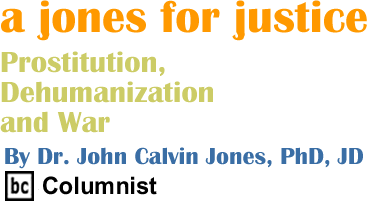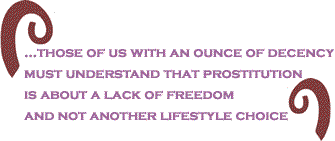
|
|||||||||||||||||||||
|
The current issue is always free to all readers If
you need the access available to a |
|
 |
|
|
Sex, Lies, and Wars of Terror The recent revelations about Mr. Randall Tobias, another disgraced Bush-moralist, are mildly amusing. Formerly the deputy secretary of USAID and charged with pushing the Bush administration's sex policy (abstinence over condoms and hypocrisy over prostitution), Mr. Tobias, like another former White House advisor, Rev. Ted Haggard, was part of Bush’s Army of Lies, Deception and Destruction. But as the mainstream media emphasizes the gotcha aspect of the story, all the while presenting the image of Ms. Deborah Jeane Palfrey as the face of Washington’s High-Class Hookers, the harsh reality of prostitution and sex trafficking is omitted. If we were to investigate even the most obvious realities of prostitution – as experienced on main street not Constitutional Avenue nor the Pretty Woman version – the acts of Mr. Tobias would not appear as simple peccadillos, but as part of a complex of violence and despair that must be prevented through affirmative government action. Prostitution: an Industry of Misery For three days in April, I was privileged to serve as the moderator for an academic conference on Human Trafficking. Speakers, activists, social workers, journalists and academics from Canada, India, Turkey, Bulgaria, Mexico, Korea and across the U.S. relayed horror stories of the lives of young girls, mothers, and boys who are tricked, duped, beaten, raped and broken – trapped in the sex industry. Practices in the U.S. or Turkey, from Thailand to Sri Lanka were the same: pimps, gangs, and members of the American military stole the human dignity of poor and damaged people – people who struggle to survive in the face of horrific treatment. What struck me the most was that the process of dehumanization and abuse in the underworld of sex trafficking occurs in our street gangs and prisons, but also in the U.S. military. Worse yet, often these practices and institutions are reinforcing. Recruitment and the Breaking Room Like others in the field who are trying to relieve the misery of victims of trafficking, Professor Mimi Chakarova shares reports of human trafficking and the brutality of prostitution with students, friends, co-workers and audiences around the world. The stories are the same, vulnerable poor women are enticed with offers to work – in a foreign country (Dubai, Germany, Turkey, Italy, etc.), told that they will be models, waitresses or singers – NOT prostitutes. Not unlike the claims of American military recruiters who promise poor youth that they will not be sent to Iraq, yet will earn money for college and to start a career. The words are all lies. Often the recruiter is female and or a friend who is trying to escape her own debt bondage to a criminal gang or pimp. If not enticed by lying eyes by some Love Bombing stranger, some of these girls walking streets in Thailand or France are simply kidnapped. Regardless, once selected or tricked or kidnapped, the girl or boy will be locked in a room … to be broken.
Held for days, these new recruits are beaten and raped repeatedly, from 30 to 60 times a day. The ordeal of dehumanizing the slave and murdering the soul goes on for three to five weeks until they are broken. How does the military put it? They break you down, in order to “build you up?” With the case of human trafficking and prostitution, as author and journalist Victor Malarek puts it, what is left is a woman who fears everything, numb to all sensation and pain, with that faraway look. Emptiness and Identity In her interviews, Mimi Chakarova discovered something that might appear curious. Frequently, these very prostitutes who have been sold numerous times, beaten mercilessly, forced to have abortions, and endured hundreds of rapes, wish to remain where they are. With such shame and feeling guilty about being duped or kidnapped, these young women cannot bear to face family or former neighbors. Suffering from a type of Stockholm Syndrome or simply a complete loss of identity, instead of finding nearly any way to escape, too many prostitutes reassure themselves that they are better off … earning money, sometimes enough to remit some to family. But when asked about their dignity and dreams of a better life, there is a confession. “Do you think that I had any dignity after they beat me and raped me for days and weeks?” I heard the same voice and the same tone when I talked to an Iraq War vet who was a sharpshooter. When asked what he thought about killing people who posed no threat to him, his family, or the United States, this chain-smoking 20-something claimed that “you do what you gotta do.” After my wife asked another vet how he was doing, with that faraway look, he responded, “on the good days or bad?” Again hearing stories of girls in Indonesia, Korea, Southern California, El Salvador, etc., a central theme of their identity repeated. They had very little of themselves left. What is a person without dreams? What is child or adult who has seen and felt unspeakable brutality? What shall we become if we allow systems of rape and forced prostitution to continue? What happens to our collective humanity when American troops – trained in brutality and dehumanization - perpetuate the abuses of the sex industry and prostitution in foreign lands from Uzbekistan to Kosovo and Iraq?
Why Legalization is Not the Answer Though I previously believed that prostitution was a mere economic choice, and deserved a place within a functioning economy, a number of the conference presenters raised the tough questions and poignant realities. Victor Malarek asked, “Would you want this life for your daughter or son? Should your son, husband, cousin, daughter be the object of their activity or be in business with sex traffickers?” Marisa Ugarte relayed that a group of well-to-do women in San Diego, California strongly favored legalized prostitution for all, save their own husbands and sons. And to recognize, as one former prostitute told us, that nearly every client just rapes the woman – who while acting and participating in the fantasy of the rapist, is terrified for her life, never knowing if the John won’t strangle her in a dark alley, back seat or empty room, those of us with an ounce of decency must understand that prostitution is about a lack of freedom and not another lifestyle choice. From a sheer economic standpoint, prostitution offers little to the economy, but takes so much. Reliant upon corrupt police, mafia gangs, intimidation and death threats, because the vast majority of prostitutes around the world are tied to syndicates, they are kept as chattel. In a world where information is power, the chief way for pimps to exercise power over their slaves is to regulate nearly every moment of their lives and keep the women in a constant state of fear.
Returning to the parallels between global prostitution our prisons and military … are the abuses and net social effects any different? Prisoners are trained to fear the guards and one another. Soldiers are trained to be absolutely obedient – to both fear and hate. While a few owners and industrialists reap the benefits and live off the fear and misery of prisoners or grunts on the front-line, the children of the rich do not go to war, do not work as prison guards, and do not plan on entering that underworld. Furthermore, these diseconomies are unsustainable, grinding up people and returning next to nothing in material goods. Restoring Honor and Dignity Though his knowledge of economic theory is limited, the man who is recognized as the President of the United States claims to be compassionate and a moralist. And while he and his aides have squandered billions on war, and destroyed Afghanistan and Iraq (where prostitution is now thriving and in heavy demand), in addition to leaving the people of New Orleans and the Gulf Coast to fend for themselves, we must recognize that some women and children have been rescued and much more can be done. In the Sea of Misery called the Bush administration, the resignation of Mr. Tobias offers us an opportunity to demand that government address real human needs and put people over profit, alleviation of suffering over greed. Sweden, a nation with a majority of female parliamentarians offers one model of recovery for prostitutes and re-socialization for Johns. If our government cared more about job training, job creation, a social safety net and sustainability, we would simultaneously reduce war-profiteering, incarceration numbers and the economic pulls of prostitution and sex work. A truly compassionate nation would see these objectives as nothing less than essential. BC Columnist Dr John Calvin Jones, PhD, JD has a law degree and a PhD in Political Science. His Website is virtualcitizens.com. Click here to contact Dr. Jones. |
|
| Home | |
| May
3, 2007 Issue 228 |
||||||||||||||
|
||||||||||||||
| Printer Friendly Version in resizeable plain text format | ||||||||||||||
|
|
||||||||||||||
 |
||||||||||||||
 |
||||||||||||||
 |
||||||||||||||
| |
||||||||||||||
| |
||||||||||||||




































